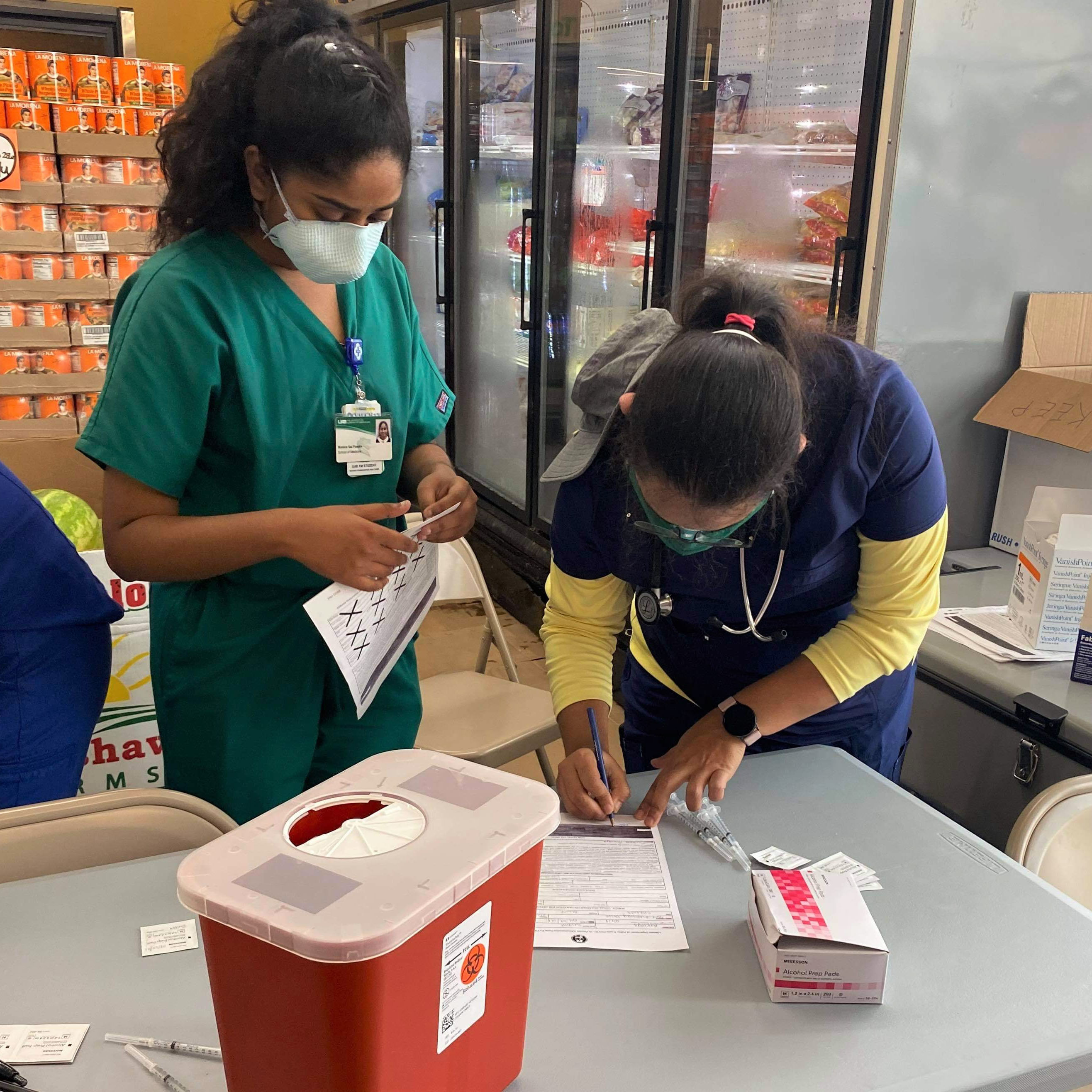 Part of becoming a doctor is learning about the barriers to care that some patients face. Medical students are encouraged to serve the communities they are learning in during their four years at UAB. As COVID-19 surges again and Alabama’s vaccination rates continue to be some of the lowest in the country, a group of medical students set out to change those numbers one vaccine at a time.
Part of becoming a doctor is learning about the barriers to care that some patients face. Medical students are encouraged to serve the communities they are learning in during their four years at UAB. As COVID-19 surges again and Alabama’s vaccination rates continue to be some of the lowest in the country, a group of medical students set out to change those numbers one vaccine at a time.
Equal Access Alabama (EAA) is a student-led group that aims to reduce the health care gap that rural areas of Alabama experience. These student leaders work to understand the issues facing Alabamians and work with local and state organizations to reduce health disparities and improve access to care for patients in rural communities.
To contribute to the ongoing effort to vaccinate all Alabamians, EAA partnered with several organizations to deliver vaccines to underserved rural areas by going door to door with doses. Beginning in May 2021, students began volunteering their time to drive to rural areas across Alabama to deliver care and answer questions about the vaccine. Alabama Statewide Area Health Education Centers Program (AHEC) is one of the organizations EAA is partnering with to provide Pfizer doses and deliver vaccines.
Glenda Stanley, associate director for Alabama AHEC, shared AHEC’s perspective on the door-to-door vaccination efforts of EAA and other partner organizations.
“As we have entered the most recent phase of our COVID-19 initiative, Alabama AHEC found it to be of the utmost importance to make outreach efforts toward home-bound members of our rural communities—patients that might be experiencing mobility or transportation issues that would impede access to care,” said Stanley. “Thanks to our student-led, door-to-door activities, and the tireless efforts of medical students at UAB through our partner EAA, we have managed to reach a great deal of individuals that might not have had the opportunity for care otherwise.”
Stanley and other Alabama AHEC leaders, including William Curry, M.D., director of the Alabama AHEC Network’s COVID-19 Initiative, further emphasized the value of local partnerships to reach underserved populations.
The Spirit of Luke Charitable Foundation, founded by Reverend Henry Ford and Sandra Ford, M.D., has been serving Black Belt communities for more than 18 years. A Promise to Help is one of their initiatives and provides medical services to remote rural areas. The Fords began working with EAA, AHEC and other local leaders to deliver vaccines to these areas with limited access to medical centers, pharmacies or physicians. Many of these residents also face challenges with work schedules or transportation, making it even more difficult to find adequate care.
EAA and its partners have held 10 vaccination clinics in Blount, Dallas, Etowah, Lowndes, Monroe, Montgomery and Wilcox counties. These clinics are staffed by volunteer doctors, nurses, medical students and community volunteers who provide vaccinations and education to local attendees.
“Health care delivery is a challenge everywhere across rural America, but I believe it is particularly so here in Alabama,” said Jack Harmon, MS3 and EAA member. “This vaccination campaign carries personal meaning to me as someone who grew up in a Black Belt County. I consider it a privilege to be able to serve my fellow Alabamians in this way.”
Harmon noted that many of the vaccination events take place in the middle of normal life in these rural communities, even during backyard BBQ cookouts (volunteers and students remained masked and distanced during vaccine clinics). He said that the volunteers are not there to pressure vaccinations but to ensure that access to vaccines is never the reason someone is unvaccinated.
Maggie Blevins, MS3, and Raymond Lopez, MS4, are leaders in EAA and remarked on the importance of partnerships with local and state-wide organizations to host these clinics. Other medical and health care professional students across the state have also pitched in to help.
“Recently, UABSOM and Auburn Edward Via College of Osteopathic Medicine students gave 161 vaccinations to Lowndes County residents on August 7, which was our biggest turnout so far,” said Blevins. “AHEC and a Promise to Help (APTH) have both been instrumental in the vaccination effort for Alabama's rural areas. Dr. Ford and Rev. Ford from APTH have made a significant impact in addressing vaccine hesitancy in the Black Belt region of Alabama and have supplied incentives for community members to get vaccinated.”
EAA is a student group on UAB’s campus. Interested students can learn more by visiting the group's Blazer Pulse page or reaching out to their president, Raymond Lopez for more information.
